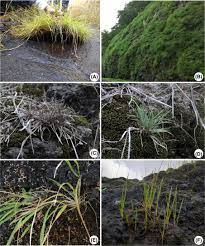New Study Uncovers 62 Desiccation-Tolerant Vascular Plant Species in India's Western Ghats, Unveiling Their Ecological Potential

IIE Digital Desk : In a significant scientific revelation, a recent study conducted in India's Western Ghats has unearthed a remarkable collection of 62 desiccation-tolerant vascular plant species. This groundbreaking discovery not only showcases the rich biodiversity of this ecologically significant region but also sheds light on the extraordinary adaptations of these plants to survive in harsh and arid conditions. The Western Ghats, known for its lush green forests and diverse ecosystems, is a UNESCO World Heritage site and a hotspot of biodiversity. The study, conducted by a team of researchers, aimed to explore the resilience and adaptability of plant life in this region, particularly in the face of water scarcity and desiccation.
The findings of the study reveal a diverse array of 62 vascular plant species that possess the remarkable ability to tolerate extreme water stress. These plants have evolved unique strategies to withstand prolonged periods of drought, ensuring their survival in the challenging environment of the Western Ghats.The discovery of these desiccation-tolerant species holds immense ecological significance. These plants play a vital role in maintaining the delicate balance of the region's ecosystems by acting as important contributors to the water cycle and providing habitats for a wide range of organisms. Furthermore, their resilience to drought conditions may hold valuable insights for developing sustainable agricultural practices and conserving water resources in arid regions.

The study employed advanced molecular techniques and extensive field surveys to identify and characterize these remarkable plant species. Scientists meticulously analyzed their physiological and genetic adaptations, unraveling the mechanisms that enable them to withstand water stress and thrive in challenging conditions.The findings also highlight the need for conservation efforts to protect and preserve the unique flora of the Western Ghats. The delicate balance of this biodiverse region faces multiple threats, including habitat destruction and climate change. Recognizing the ecological potential of these desiccation-tolerant plant species serves as a reminder of the urgent need to safeguard this precious natural heritage.
This breakthrough study in the Western Ghats showcases the marvels of adaptation in the plant kingdom and exemplifies the importance of biodiversity research. It adds to our understanding of the intricate relationships between organisms and their environment, providing valuable insights into the resilience of life in the face of environmental challenges. As scientists delve deeper into the mysteries of the natural world, studies like these not only expand our knowledge but also inspire conservation efforts and sustainable practices. The discovery of these 62 desiccation-tolerant vascular plant species in India's Western Ghats offers a glimpse into the astonishing adaptations of nature and reinforces the need for continued research and conservation to protect our planet's invaluable biodiversity.
You might also like!


























